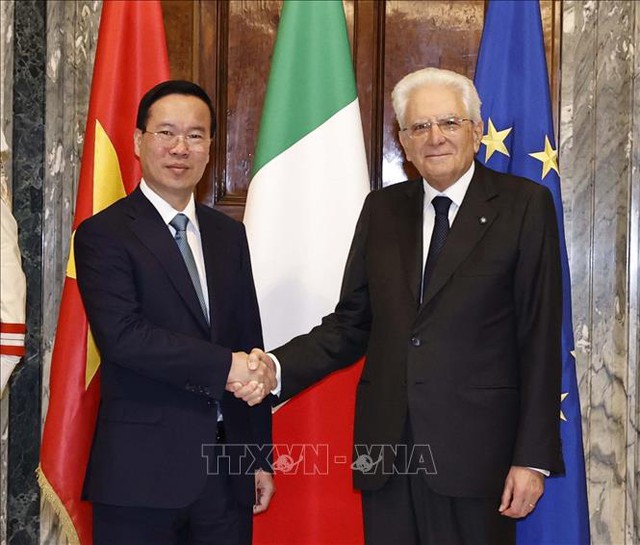Viet Nam, Italy benefit from EVIPA as Italian Parliament ratifies it
VGP - Italian President Sergio Mattarella has announced that the Italian Parliament ratified the EU-Viet Nam Investment Protection Agreement (EVIPA) right on the day President Vo Van Thuong began his state visit to Italy.

President Vo Van Thuong (L) and Italian President Sergio Mattarella hold talks, Rome, Italy, July 26, 2023 - Photo: VNA
The Vietnamese President and his Italian counterpart discussed and agreed on major orientations and measures to strengthen the Viet Nam–Italy strategic partnership at their talks in Rome on July 26.
Vo thanked Italy for ratifying the EVIPA and stressed that the deal would bring benefits to businesses and people of both nations. He also proposed Italy urge other EU members to soon ratify the agreement.
At the talks, Mattarella affirmed that Italy highly appreciates Viet Nam's status and role in the Asia–Pacific region, adding that he was impressed with Viet Nam's dynamic economic development.
He vowed to join hands with the Southeast Asian country to further promote the bilateral strategic partnership, thus contributing to the sustainable development in each nation and jointly coping with global challenges.
The host emphasized the need to continue effectively carrying out the EU-Viet Nam Free Trade Agreement (EVFTA), affirming to support the European Commission (EC)'s removal of its "yellow card" against Vietnamese seafood exports.
President Vo asserted that Viet Nam treasures Italy in its foreign policy.
Both leaders underlined the significance of the Vietnamese President's ongoing visit on the occasion of the 50th anniversary of diplomatic ties and the 10th anniversary of the bilateral strategic partnership.
They expressed their delight on the fruitful development in economic-trade-investment ties with bilateral trade reaching US$6.2 billion in 2022.
Viet Nam is currently the biggest trading partner of Italy in ASEAN, while Italy is a leading partner of Viet Nam in Europe.
Italy now ranks 33rd out of 143 countries and territories directly investing in Viet Nam.
In terms of politics, the two leaders agreed to step up the exchange of delegations at all levels, especially high-level ones, via state, government and parliament channels; and continue effectively implementing bilateral cooperation mechanisms.
The two leaders consented to enhance people-to-people exchanges by stepping up cooperation in education-training, culture-arts, tourism, locality-to-locality cooperation, and student exchanges, among others.
Both expressed their support for the establishment of cultural centers in each country to promote understanding and connectivity between the people of the two countries.
They pledged to expand cooperation in security-defense, science-technology; continue to support each other at multilateral forums such as the ASEAN-EU cooperation framework, Asia-Europe Meeting (ASEM), and the United Nations, and response to global issues like climate change and food security.
Regarding the East Sea issue, the two leaders reaffirmed the importance of ensuring peace, stability, security, safety and freedom of navigation and aviation in the East Sea, and settling disputes via peaceful measures on the basis of international law, especially the 1982 United Nations Convention on the Law of the Sea (UNCLOS)./.

